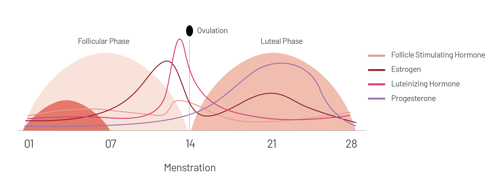The menstrual cycle
The menstrual cycle
See the full section on the menstrual cycle in the Balanced Female Health handbook or read a summary of key points below.
Understanding the menstrual cycle
The menstrual cycle should occur regularly (every 21-35 days) and is an important measure of health – like a monthly report card.
The menstrual cycle can give insights into the ability to cope with the multiple aspects of a person’s life, including fuelling, training load and recovery.
Symptoms in and around the period such as blood loss, abdominal cramps or pre-menstrual symptoms should not stop enjoyment of or engagement in school, work, social or physical activity.
Changes to the menstrual cycle such as irregular or absent periods, or heavy or painful bleeding, may indicate that the body is under stress with an imbalance between the physical and psychological demands.

Did you know?
Not having a period is not normal, even with hard exercise. Absence of the menstrual cycle can impact on bone health and injury risk due to the altered production of many important health hormones.
Supporting young people who menstruate
As coaches, instructors or parents you can:
- Encourage overall balance including proper sleep, recovery, a mix of activities and connections (both social and emotional) and proper fuelling and hydration before and after physical activity. This helps to support a regular menstrual cycle
- Have a variety of period products available at school, home and in recreational facilities or environments.
- Support pubertal change with open communication about menstrual cycle related issues.
- Encourage individuals to track their menstrual cycle and symptoms. Use this awareness to help with planning, preparation and performance in their chosen activities.
- Encourage young people to seek medical advice if their menstrual cycle is interfering with their daily lives.
Consider this
Everyone experiences their menstrual cycle differently. Support decision making around young people’s individual experiences and symptoms.